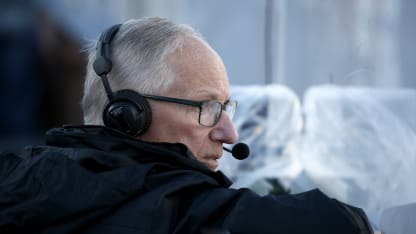The 74-year-old will continue to contribute to NBC Sports by occasionally writing and narrating video essays for its NHL coverage.
"Partway through the playoffs, which NBC graciously allowed me to do from home, I became very aware not only of how fortunate I was to continue to be safe here at home, but aside from my (prostate) cancer scare in 1991, to have been healthy these past 50 years since reporting on the NHL for the first time," Emrick said. "Reflecting back on that time, I'm still OK.
"It seemed like it was time. I guess 50 (years) was a round number in covering the League, and it was just also a time that in your mid-70s you realize that you have had a very healthy, long run except for the cancer scare and you are looking outside and seeing this to be the autumn of your years and a time when, as you are healthy, that you still want to do that. So there's certainly still the love for hockey that I always had, but this is the time for turning to other things, including a commitment to helping people with the animals. There's no backstory. There's no other thing. This is it."
Watch: Youtube Video
Emrick worked the Stanley Cup Final 22 times, 45 Stanley Cup Playoffs/Final Game 7s, six Olympics, 14 NHL All-Star Games and 19 NHL Winter Classics and Stadium Series games, including the inaugural Winter Classic between the Pittsburgh Penguins and Buffalo Sabres at Ralph Wilson Stadium in Buffalo on Jan. 1, 2008. Emrick estimated he's called more than 3,750 professional and Olympic hockey games.
"The risk one takes in saying something about Doc Emrick is that you know he could have worded it better himself, on the spur of the moment, with 20,000 fans screaming in his ears (or up to 105,000 in the rain, snow and/or bitter cold), to a national broadcast audience relying on him to get it just right," NHL Commissioner Gary Bettman said. "In the 103-year history of the National Hockey League, nobody has ever conveyed the sights, sounds, passion, excitement, thrills and intricacies of our game better.
"His command of the English language under the most frenetic conditions defies comprehension. His unabashed wonder at the skill and courage of hockey players -- as genuine in his call of Game 6 of the 2020 Stanley Cup Final as in his first day doing hockey play-by-play in 1971 -- always reminded listeners and viewers of the marvel he was describing. His reverence for hockey's traditions and history, coupled with his devilish sense of humor, conveyed that, while he knew he was calling a game, it was always much more to him than just a game.
"For obvious reasons, hockey is the most challenging sport for a play-by-play man. Doc somehow didn't just master it, he transformed it into art. The game, of course, goes on. But it never again will sound quite the same."
Emrick won the Foster Hewitt Award, presented by the Hockey Hall of Fame for outstanding contributions to hockey broadcasting, in 2008. He became the first broadcaster inducted into the United States Hockey Hall of Fame in 2011, the year he won the first of eight Sports Emmy Awards for Outstanding Sports Personality -- Play-by-Play, including seven straight from 2014-20.
"I will only quote what my mentor, Bob Chase, used to say to me: 'Be yourself,'" Emrick said. "And I think that's what I've tried to be.
"... One of the things that I've learned over time is, I've never done a perfect game out of all of those 3,700 or whatever it is. And I realized after a while that I was never going to do that. So I had to just relax and realize, as Bob Chase said, 'Be yourself,' and myself was not a perfect individual. So I just enjoyed the fact that I was given a free seat, a good seat, and I got to work with some of the best athletes in the world and then twice a month I got something in the mail, and it was really good."


















